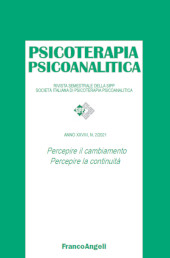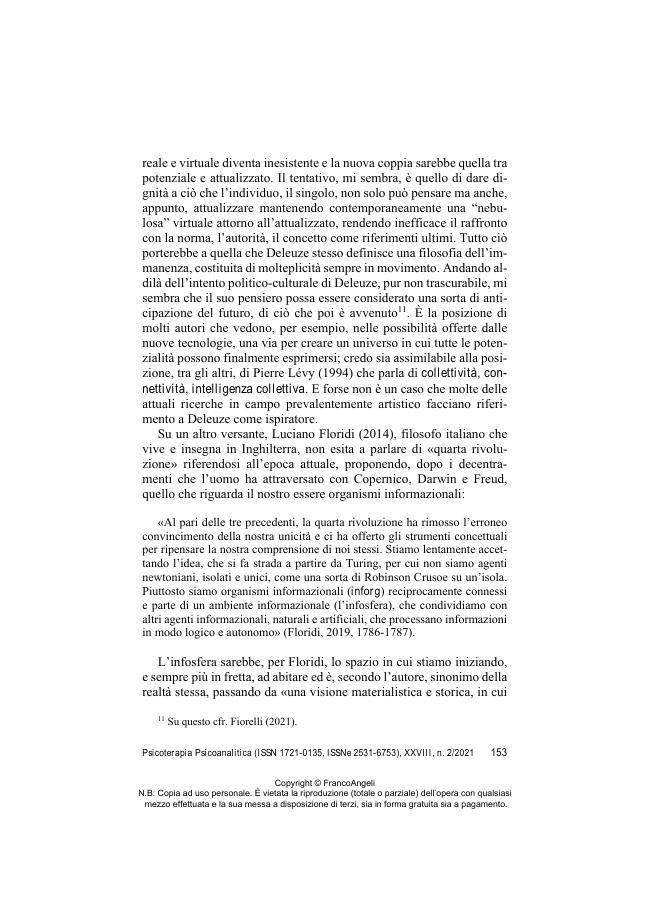La scomparsa della realtà
143-163 p.
In questo lavoro l'autore si interroga sulle possibili conseguenze delle trasformazioni attuali in campo tecnologico sulla teoria e sulla pratica psicoanalitiche. In particolare, viene presa in considerazione la progressiva "virtualizzazione" della realtà che molti autori, in ambito filosofico e no, rilevano. Se viene meno la nozione di realtà per come la si è sempre pensata per esempio contrapposta alla fantasia e all'immaginazione sono ancora valide le categorie che la psicoanalisi utilizza e che derivano da un pensiero che si è costituito prima che tali trasformazioni avvenissero? La stessa nozione di genealogia sembra in profonda trasformazione: come incide su alcuni dei fondamenti su cui la psicoanalisi poggia, per esempio la differenza tra le generazioni? Anche il corpo appare soggetto alla stessa opera di smaterializzazione e disseminazione; ne sarebbero testimonianza le opere recenti di artisti che utilizzano ciò che le nuove tecnologie mettono a disposizione.
Non occorre allora ripensare alcuni fondamenti della psicoanalisi proprio a partire, però, dal metodo classico che può fornire comunque una sonda e uno sguardo scientifico su questa nuova categoria di umano che sembra andare costituendosi? Anche nell'ambito psicoanalitico stesso si sta riflettendo sull'impatto di tali cambiamenti, forse irreversibili, e confrontando con l'esigenza di individuare un possibile, ma probabilmente necessario, punto di equilibrio tra la tradizione psicoanalitica, con i suoi strumenti di indagine, e il "nuovo" che si sta manifestando. [Testo dell'editore].
In this work, the author questions the possible consequences of current transformations in the technological field on psychoanalytic theory and practice. In particular, the progressive "virtualization" of reality is taken into consideration, which many authors, in the philosophical and nonphilosophical fields, detect. If the notion of reality as it has always been thought of - for example as opposed to fantasy and imagination - is lost, are the categories that psychoanalysis uses and that derive from a thought that was constituted before such transformations took place, still valid? The notion of genealogy itself seems to be in profound transformation: how does it affect some of the foundations on which psychoanalysis rests, for example the difference between generations? The body too appears subject to the same work of dematerialization and dissemination; the recent works of artists who use what new technologies make available would testify to this.
Isn't it necessary then to rethink some of the foundations of psychoanalysis precisely starting, however, from the classical method which can still provide a probe and a scientific look at this new category of human that seems to be forming? Even in the psychoanalytic sphere itself we are reflecting on the impact of these changes, perhaps irreversible, and confronting the need to identify a possible, but probably necessary, point of balance between the psychoanalytic tradition, with its instruments of investigation, and the "new" that is manifesting itself. [Publisher's text].
Forma parte de
Psicoterapia psicoanalitica : 2, 2021-
Artículos del mismo número (disponibles individualmente)
-
Información
Código DOI: 10.3280/PSP2021-002010
ISSN: 2531-6753
MATERIAS
KEYWORDS
- virtuale, realtà, fantasia, psicoanalisi, tecnologia, trasformazioni
- virtual, reality, fantasy, psychoanalysis, technology, transformations



